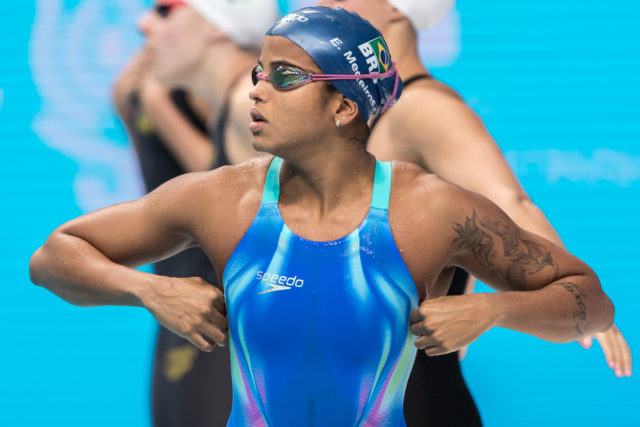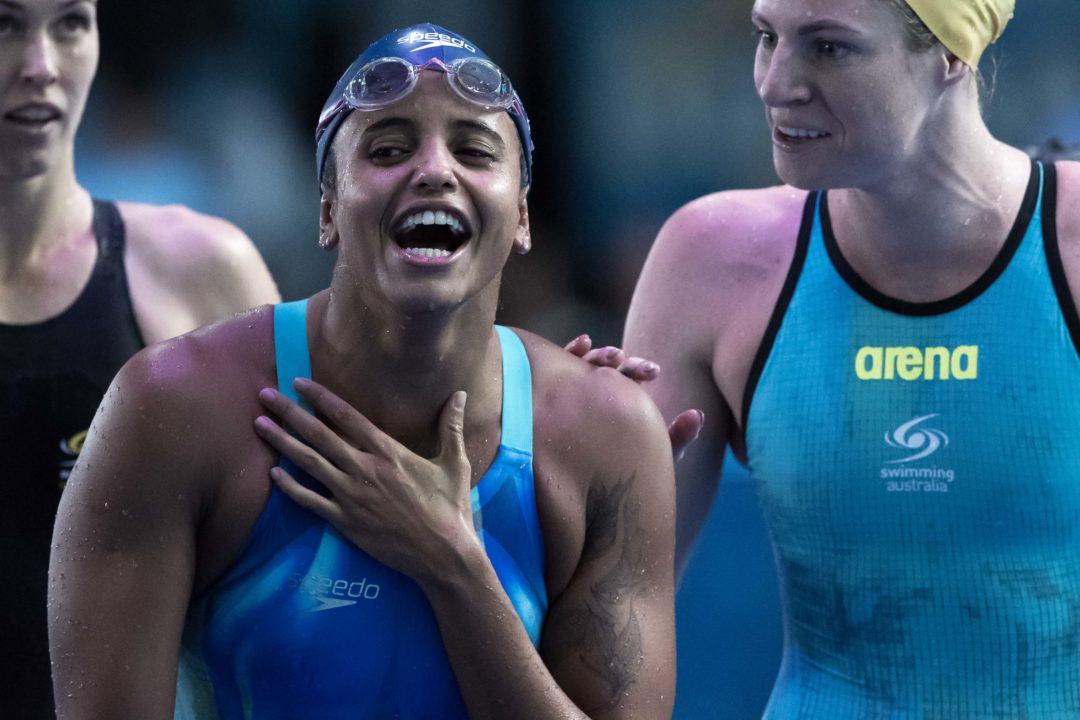To see all of our 2017 Swammy Awards presented by TYR, click here.
2017 SOUTH AMERICAN FEMALE SWIMMER OF THE YEAR: ETIENE MEDEIROS
Though the Brazilian men have won 26 long course world championship medals and 13 Olympic medals in the pool, until this year, the Brazilian women had won just one spot on the long course worlds podium (Etiene Medeiros‘s Kazan 50 back silver in 2015). Few other countries with Brazil’s size and status have the same level of disparity between men’s and women’s programs.

Etiene Medeiros. Photo: Peter Sukenik
The explanation is at least partially cultural. As recently as recently as 1979, it was illegal for women to play many sports, including soccer, competitively or recreationally, although they weren’t barred from swimming. Though women’s sports have made astronomical progress in recent years, studies have shown that societal factors discourage Brazilian girls from participating in athletics.
In recent years, sprint star Etiene Medeiros has been on the forefront of a wave of Brazilian female swimmers who have seen success on an international level. However none have been able to approach Medeiros’s packed resume that includes multiple short course world title, a short course world record, the 2015 World Championships silver, and multiple Swammy Awards (2014 South American Swimmer of the Year, 2016 South American Female Swimmer of the Year).
This summer in Budapest, Medeiros clocked 27.14 for gold in the 50 back, out-touching defending champion and favorite Fu Yuanhui of China by .01 and missing the world record by just .08.
Her performance was a huge personal victory, but more importantly, it was a cultural win for Brazilian women’s swimming, the first-ever long course world title ever won by a Brazilian woman.
HONORABLE MENTIONS
In no particular order
- Joanna Maranhão: Maranhão started off her year with rough news in January, when the Brazilian

Joanna Maranhao. Photo: Satiro Sodré/SSPress/CBDA
Pinheiros swim club dropped her from the team, citing her age (Maranhão was 29 at the time). She continued her training with the University of Santa Cecilia (Unisanta) through the year. In May, Maranhão seized her chance to stick it to Pinheiros by lowering her own 200 fly record with a 2:09.22 at the Maria Lenk trophy. She went on to make the Budapest World Championships semifinals in the 200 IM and break a South American record in the with 2:11.24.
- Julia Sebastian: Though Sebastian, an Argentinian breaststroker, had her 200 breast South American record taken over by her countrywoman Macarena Ceballos (2:26.90) at the Maria Lenk Trophy in April, Sebastian struck back in November at the Troféu FAP de Natação. At that meet, Sebastian slid under Ceballos mark to take over the South American record with 2:26.87.


RE: Joanna Maranhão….they really dropped her cause she was too old? 29 isn’t ancient either, Couglin, Vollmer, Dara Torres were all older and successful.
Ana Marcela-Cunha
Stay tuned for our Open Water Swammys
She’s more like the GOAT of Open Water Swimming, not only South America’s best.